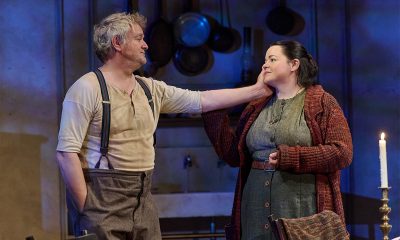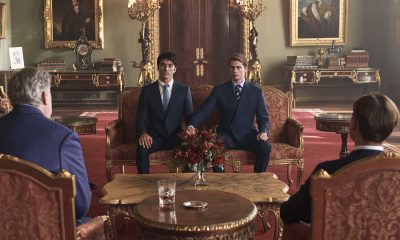Theater
Character-driven ‘Inheritance’ echoes literary debt with generational interminglings
Hit Broadway play borrows liberally from a gay past — in multiple ways
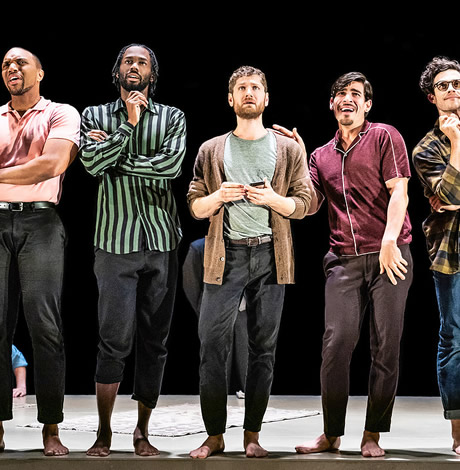
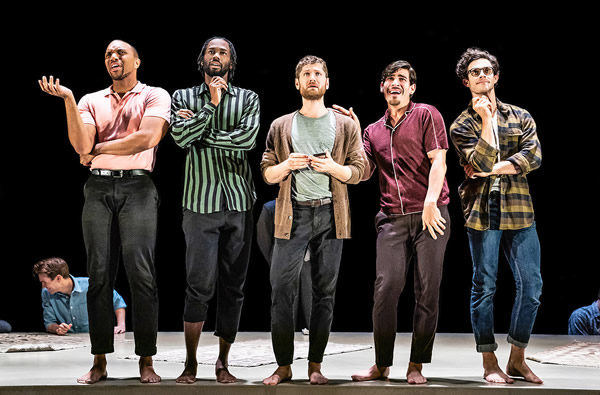
Like a writer on deadline, desperate to fill blank space with words of legacy-worthy brilliance, no one who populates “The Inheritance” is beyond borrowing a page or two from the past, if they think it might prove useful in defining or defending themselves.
Making its mark on Broadway, with much of the stellar cast in tow after an award-winning 2018 run on London’s West End, Matthew Lopez’s six-and-a-half-hour, two-part look at friendships and friction between contemporary gay Manhattanites and those who lived on the island during the height of the HIV/AIDS epidemic, owes its pulpy plot to “Howards End.” Following previews, it officially opened last week at the Ethel Barrymore Theatre (243 W. 47th St.) in New York (tickets are here).
Chalk it up to generational differences if you hold the 1992 Merchant Ivory film adaptation in roughly the same esteem as the 1910 E. M. Forster novel — a transgression committed early on by a youthful “Inheritance” character in one of many alternately playful and finger-wagging know-your-history moments. And we need those moments, especially since Young Man 10 goes on to note, of Forster’s turn-of-the-century setting, “But I mean, the world is so different now. I can’t identify with it at all.”
Lopez knows otherwise. And as Act I begins, he makes his case with epic gusto, examining the eternal push and pull between the knowing and the uninformed, the rich and the poor, the healthy and the sick, the upward trajectory and the downward spiral.
It’s that last category that does much of the heavy lifting. By casting actors in dual roles both complementary and contrasting, and bringing together characters who share similar traits and fates, the lines between disparate generations begin to blur although stark differences remain, as they prod each other on matters of meaning and morality.
Even the play’s philosophically opposed are hard-pressed not to see themselves in their sparring partner and their willingness to pivot is what separates victor from victim.
At the play’s molten core is fundamentally decent, newly minted 33-year-old Eric Glass (Kyle Soller), whose culinary skills and nurturing instincts earn him the loyalty of a catty group of chatty gay chums, each seemingly more driven and successful than he is. Jason and Jason are both teachers (and happily married), Tristan is a doctor and Eric works for a social justice engineering company. That Jasper founded. At 21.
Good jobs and self-image aside, looming large in Part 1 is Eric’s increasingly fraught relationship with Toby Darling (Andrew Burnap), a soon-to-be successful novelist/playwright with a hidden past and an emerging sweet tooth for fame, Fire Island, tweaking and twinks.
Eric and Toby live — thoroughly above their station — in a rent-controlled Upper West Side apartment that’s been in Eric’s family since his grandmother and grandfather signed the lease in 1947 (gasps shot through the Ethel Barrymore Theatre when the monthly charge for their three-bedroom, two-bathroom abode, with terrace, was revealed to be a paltry $575).
Following his grandmother’s death, Eric moved in, but not with a strong enough claim to prevent eviction. Years go by until building management starts that process — news Eric keeps from Toby through the duration of their engagement. Words are exchanged. Wedding rings are not.
Also living in Eric’s building is contemplative Walter Poole (Paul Hilton), described by Toby as “a sheer curtain in front of an open window. He’s like Valium.” Walter shares an apartment with his longtime partner, Henry Wilcox (strapping John Benjamin Hickey, who balances his character’s Republicanism with intensity, charisma and just enough likability to keep detractors off balance). Both are drawn into Eric’s orbit and emerge the better for it, but they’ve got decades on him and with that comes a gravity that exerts profound influence.
Walter sees in Eric a kindred spirit and uses his own story to set him on a path that will give his life meaning and purpose. Henry’s contribution is just as profound, although not as nurturing. (He withholds news of Walter’s desire that Eric inherit a steeped-in-history upstate property they purchased during their early years together.)
Henry’s denial of that dying wish comes back to bite in Part II, when he and Eric, both feeling the absence of their significant others, form an unlikely bond, which leads to an even more inexplicable marriage. Meanwhile, Toby shacks up with Leo, a down-on-his-luck sex worker who bares a striking resemblance to Adam, the young man Eric and Toby took under their wings in happier times.
Samuel H. Levine plays Adam and Leo, with vocal and posture choices that cry out for a new Tony Award category. Newbie actor Adam, cast as the lead in Toby’s wildly successful, based-on-his-book Broadway play, earns him sudden notoriety. Leo winds up back on the streets, when his mentor/student relationship with Toby turns sour.
HIV positive and seemingly destined for the grave, Leo has a chance encounter with Eric, whose separation from Henry will bring all concerned back to that highly contested upstate property, where the play’s title looms like the dates-back-to-George-Washington cherry tree that stands firm at the foot of a dwelling filled with the ghosts of former residents.
The house, you see, is where Walter established a de facto hospice for dozens of ’80s-era gay men who had nowhere else to turn during the final stages of AIDS. That sprawling act of altruism, which originated with Walter’s single act of kindness toward a mutual friend about to succumb to the plague, drew Henry’s contempt and infected their relationship until its dying day.
Yikes. That’s a lot to digest — and in the unlikely event you lack food for thought during intermission, the condom-filled basket at the tail end of the long line to the men’s room reminds one that stimulating conversation isn’t the only thing worth pursuing after curtain time.
As for the runtime, a bit of pruning wouldn’t hurt. In scenes with Eric and the gang capering about the stage dispensing cocktail party takes on matters such as what constitutes camp, the play enters too-cute-by-half territory.
It’s a good thing we have E. M. Forster roaming the boards, because he excels at putting things in context and perspective. Living to 91 and being dead since 1970 will do that to a person. And it doesn’t hurt in the least to be played by Paul Hilton, who brings to the role many of the same introspective qualities he’s poured into Walter, but with an even more profound sense of loss, melancholy and hope.
Introduced in the prologue as a professorial presence who guides a group of young writers through the creation of the work that will become the play we’re watching (subject to revision, as we go along), Morgan is so invested in their success, he even lets them use the first sentence of “Howards End” as a starting point.
Such acts of benevolence come easy to the author, who sees in these young men every brave choice and liberating possibility he denied himself.
Appearing to Leo on a Fire Island beach, under the light of a full moon (yes, he does that sort of thing, just go with it), Morgan calls his gay-themed novel “Maurice,” written in 1914 but held for publication until his death, “the most terrifying and the most exhilarating thing I had ever done. Hiding it from the world was the most shameful.”
That may or may not be how Morgan (aka Forster) would have actually felt. As written, he’s more better angel than dogged biographical sketch — appropriate, perhaps, for a play that reaches its own heights by burning through the source material it inherited. In doing so, Lopez invites us to dine out on a hard truth: Those who follow in our footsteps need good stories in order to create their own, so keep that in mind, and act accordingly.
Theater
‘Andy Warhol in Iran’ a charming look at intersection of art, politics
Mosaic production plumbs kidnapping plot of iconic artist for humor

‘Andy Warhol in Iran’
Through July 6
Mosaic Theater Company at Atlas Performing Arts Center
1333 H St., N.E., WDC
$70
Mosaictheater.org
Behind the blasé veneer, Andy Warhol was more curious than people knew. Particularly when it came to money. He kept a close eye on how the ultra-rich lived, what fellow artists were being paid and who was paying them, and, of course, all the new and more saleable ways of making and selling art.
In playwright Brent Askari’s “Andy Warhol in Iran,” now playing at Mosaic Theater Company, Warhol (Alex Mills) is brought outside of his usual area of interest when he lands face to face with a young revolutionary. While Warhol could be artistically revolutionary, he didn’t connect with the idea of forgoing the pursuit of money and fame for the infinitely more difficult task of achieving social justice.
The 90-minute play is not fully factual, but rather inspired by Warhol’s real life 1976 trip to Tehran to make portraits of the royal Pahlavi family in the waning days of their reign, with a focus on Farah Diba, the Shah’s elegant wife and Iran’s last empress.
The action unfolds in a Tehran hotel suite boasting a glorious view of the snowcapped Alborz Mountains not far from Iran’s vibrant and bustling capital. It’s here, disguised as room service, that Farhad (played by Nathan Mohebbi) gains entrance to Warhol’s rooms, seeking to kidnap the pop art star to garner attention for the university students’ movement.
Warhol meets the armed intruder with a sort of wide-eyed wonderment, flummoxed why he has been selected for abduction. Warhol can’t understand why a young man like Farhad wouldn’t prefer to be paid a big ransom on the spot, or be cast as a star in one of the Warhol Factory flicks.
When Farhad replies it’s because Warhol is the most decadent artist in the world, Warhol mistakenly takes it for the ultimate compliment. After all, his biggest successes had been connected to celebrity and consumerism (think Campbell’s Soup Cans. 1962).
For Warhol, decadence is aspirational. He made portraits of financiers, movie stars, and jet setters. In fact, he’d been obsessed with the lives of the rich and famous since he was a small kid in Pittsburgh thumbing through Photoplay Magazine while bed bound with Saint Vitus Dance.
Accompanying Warhol to Tehran (unseen) are his business manager Fred Hughes, and Bob Colacello, editor of Interview magazine. Together, they make a merry trio of gay social climbers. These kinds of trips were a boon to the artist. Not only did they solidify a new strata of high society contacts, but were also superbly lucrative, thickly padding the painter’s pockets.
While in Iran, Warhol wanted only to view Farah’s vast world-class collection of jewels, sample the caviar on tap, and get his Polaroids. Then he’d fly first class back to New York and transfer the images to silk screen and sell the portraits to the Persian royals at a hefty price. He didn’t foresee any obstacles along the way.
Serge Seiden’s direction is spot on. He’s rendered a wonderfully even two-hander with a pair of terrifically cast actors. And Seiden plumbs the piece for humor mostly drawn from the absurdity of the situation without missing any of the serious bits.
As Warhol, out actor Mills is instantly recognizable as the eccentric artist. He’s wearing the button-down shirt, jeans, blazer, glasses, and, of course the famed shock of white hair wig (here a little more Karen than Andy). His portrayal is better than an imitation. He gives a bit of the fey and confused, but has also infuses him with a certain dynamism.
The energy works well with the intensity of Mohebbi’s would-be kidnapper Farhad. And while it isn’t a romance, it’s not impossible to think that Warhol might fall for a handsome male captor.
The connection between art and politics is almost always interesting; and though not a super deep dive into the era or the life of an artist, “Andy Warhol in Iran” is a compelling, charming, and sometimes funny glimpse into that intersection.
Theater
‘Hunter S. Thompson’ an unlikely but rewarding choice for musical theater
‘Speaks volumes about how sad things land on our country’

‘The Untitled Unauthorized Hunter S. Thompson Musical’
Through July 13
Signature Theatre
4200 Campbell Ave., Arlington, Va.
$47 to $98
Sigtheatre.org
The raucous world of the counterculture journalist may not seem the obvious choice for musical theater, but the positive buzz surrounding Signature Theatre’s production of Joe Iconis’s “The Untitled Unauthorized Hunter S. Thompson Musical” suggests otherwise.
As the titular, drug addled and gun-toting writer, Eric William Morris memorably moves toward his character’s suicide in 2005 at 67. He’s accompanied by an ensemble cast playing multiple roles including out actor George Salazar as Thompson’s sidekick Oscar “Zeta” Acosta, a bigger than life Mexican American attorney, author, and activist in the Chicano Movement who follows closely behind.
Salazar performs a show-stopping number — “The Song of the Brown Buffalo,” a rowdy and unforgettable musical dive into a man’s psyche.
“Playing the part of Oscar, I’m living my Dom daddy activist dreams. For years, I was cast as the best friend with a heart of gold. Quite differently, here, I’m tasked with embodying all the toxic masculinity of the late ‘60s, and a rampant homophobia, almost folded into the culture.”
He continues, “My sexuality aside, I like to think that Oscar would be thrilled by my interpretation of him in that song.
“Our upbringings are similar. I’m mixed race – Filipino and Ecuadorian and we grew up similarly,” says Salazar, 39. “He didn’t fit in as white or Mexican American, and fell somewhere in the middle. Playing Oscar [who also at 39 in 1974 forever disappeared in Mexico], I pulled out a lot of experience about having to code switch before finally finding myself and being confident just doing my own thing.
“As we meet Oscar in the show we find exactly where’s he’s at. Take me or leave me, I couldn’t care less.”
In 2011, just three years after earning his BFA in musical theater from the University of Florida in Gainesville, Salazar fortuitously met Iconis at a bar in New York. The pair became fast friends and collaborators: “This is our third production,” says George. “So, when Joe comes to me with an idea, there hasn’t been a moment that I don’t trust him.”
In “Be More Chill,” one of Iconis’s earlier works, Salazar originated the role of Michael Mell, a part that he counts as one of the greatest joys of artistic life.
With the character, a loyal and caring friend who isn’t explicitly queer but appeals to queer audiences, Salazar developed a fervent following. And for an actor who didn’t come out to his father until he was 30, being in a place to support the community, especially younger queer people, has proved incredibly special.
“When you hear Hunter and Oscar, you might think ‘dude musical,’ but I encourage all people to come see it.” Salazar continues, “Queer audiences should give the show a shot. As a musical, it’s entertaining, funny, serious, affecting, and beautiful. As a gay man stepping into this show, it’s so hetero and I wasn’t sure what to do. So, I took it upon myself that any of the multiple characters I play outside of Oscar, were going to be queer.
Queer friends have seen it and love it, says Salazar. His friend, Tony Award-winning director Sam Pinkleton (“Oh, Mary!”) saw Hunter S. Thompson at the La Jolla Playhouse during its run in California, and said it was the best musical he’d seen in a very long time.
“Since the work’s inception almost 10 years ago, I was the first Oscar to read the script. In the interim, the characters’ relationships have grown but otherwise there have been no major changes. Still, it feels more impactful in different ways: It’s exciting to come here to do the show especially since Hunter S. Thompson was very political.”
Salazar, who lives in Los Angeles with his partner, a criminal justice reporter for The Guardian, is enjoying his time here in D.C. “In a time when there are so many bans – books, drag queens, and travel — all I see is division. This is an escape from that.”
He describes the Hunter Thompson musical as Iconis’s masterpiece, adding that it’s the performance that he’s most proud of to date and that feels there a lot of maturity in the work.
“In the play, Thompson talks to Nixon about being a crook and a liar,” says Salazar. “The work speaks volumes about how sad things land on our country: We seem to take them one step forward and two steps back; the performance is almost art as protest.”
Theater
A hilarious ‘Twelfth Night’ at Folger full of ‘elegant kink’
Nonbinary actor Alyssa Keegan stars as Duke Orsino
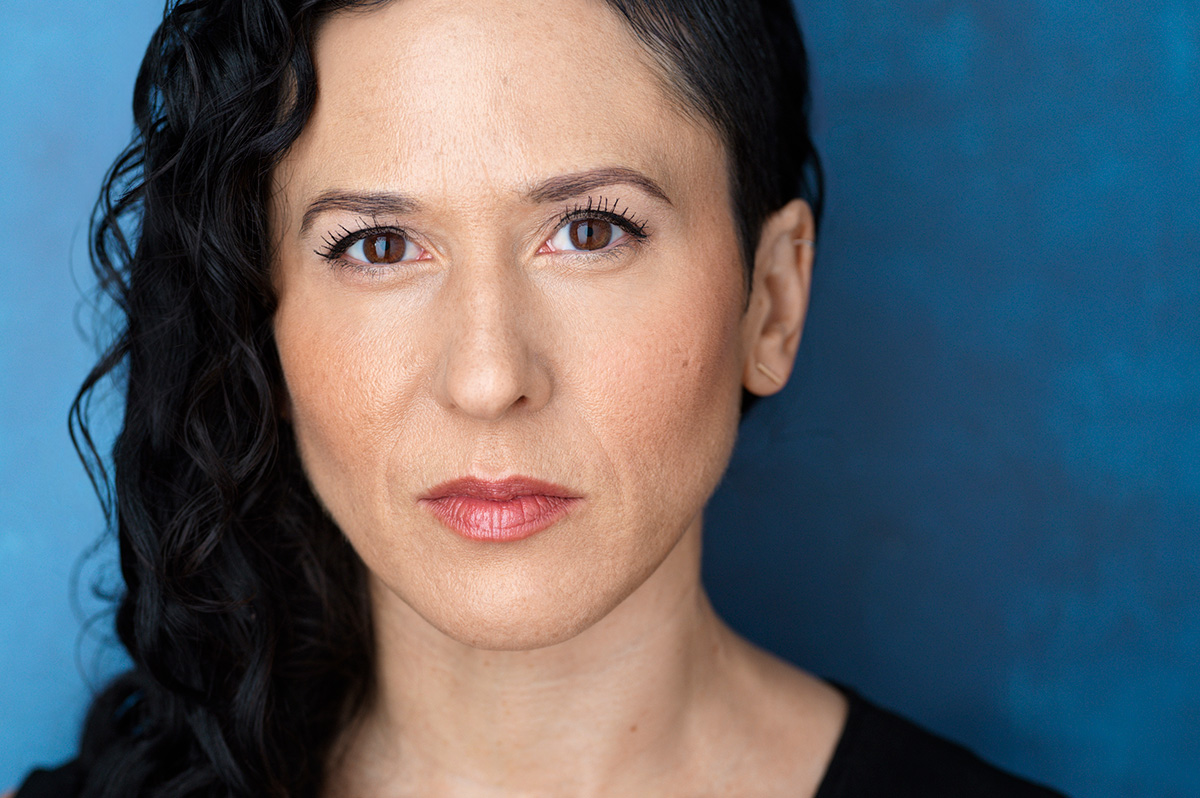
‘Twelfth Night’
Through June 22
Folger Theatre
201 East Capitol St., S.E.
$20-$84
Folger.edu
Nonbinary actor Alyssa Keegan (they/them)loves tapping into the multitudes within.
Currently Keegan plays the melancholic Duke Orsino in Folger Theatre’s production of Shakespeare’s romantic comedy “Twelfth Night.” Director Mei Ann Teo describes the production as “sexy, hilarious, and devastating” and full of “elegant kink.”
Washington-based, Keegan enjoys a busy and celebrated career. Her vast biography includes Come From Away at Ford’s Theatre; Cat on a Hot Tin Roof (Helen Hayes Award, Best Actress) and Paula Vogel’s How I Learned to Drive, both at Round House Theatre; Diana Son’s Stop Kiss directedby Holly Twyford for No Rules Theatre Company; and Contractions at Studio Theatre, to name just a few.
In addition to acting, Keegan works as a polyamory and ethical non-monogamy life and relationship coach, an area of interest that grew out of personal exploration. For them, coaching seems to work hand in hand with acting.
WASHINGTON BLADE: You’re playing the lovesick Orsino in Twelfth Night. How did that come about?
ALYSSA KEEGAN: The director was looking to cast a group of actors with diverse identities; throughout auditions, there were no constraints regarding anyone’s assigned sex at birth. It was really a free for all.
BLADE: What’s your approach to the fetching, cod-piece clad nobleman?
KEEGAN: Offstage I identify as completely nonbinary; I love riding in this neutral middle space. But I also love cosplay. The ability to do that in the play gives me permission to dive completely into maleness.
So, when I made that decision to play Orsino as a bio male, suddenly the part really cracked open for me. I began looking for clues about his thoughts and opinions about things like his past relationships and his decision not to date older women.
Underneath his mask of bravura and sexuality, and his firmness of feelings, he’s quite lonely and has never really felt loved. It makes sense to me why his love for Olivia is so misguided and why he might fall in love with the Cesario/Viola character.
BLADE: As an actor, do you ever risk taking on the feelings of your characters?
KEEGAN: Prior to my mental health education, yes, and that could be toxic for me. I’ve since learned that the nervous system can’t tell the difference between real emotional distress and a that of a fully embodied character.
So, I created and share the Empowered Performer Project. [a holistic approach to performance that emphasizes the mental and emotional well-being of performing artists]. It utilizes somatic tools that help enormously when stepping into a character.
BLADE: Has changing the way you work affected your performances?
KEEGAN: I think I’m much better now. I used to have nearly debilitating stage fright. I’d spend all day dreading going onstage. I thought that was just part of the job. Now, I’ve learned to talk to my body. Prior to a performance, I can now spend my offstage time calmly gardening, working with my mental health clients, or playing with my kid. I’m just present in my life in a different way.
BLADE: Is Orsino your first time playing a male role?
KEEGAN: No. In fact, the very first time I played a male role was at the American Shakespeare Center in Staunton, Va. I played Hipolito in Thomas Middleton’s The Revenger’s Tragedy.
As Hipolito, I felt utterly male in the moment, so much so that I had audience members see me later after the show and they were surprised that I was female. They thought I was a young guy in the role. There’s something very powerful in that.
BLADE: Do you have a favorite part? Male or female?
KEEGAN: That’s tough but I think it’s Maggie the Cat. I played the hyper-female Maggie in Tennessee Williams’ Cat on a Hot Tin Roof at Round House. In the first act she didn’t stop talking for 51 minutes opposite Gregory Wooddell as Brick who barely had to speak. That lift was probably the heaviest I’ve ever been asked to do in acting.
BLADE: What about Folger’s Twelfth Night might be especially appealing to queer audiences?
KEEGAN: First and foremost is presentation. 99% of the cast identify as queer in some way.
The approach to Shakespeare’s text is one of the most bold and playful that I have ever seen. It’s unabashedly queer. The actors are here to celebrate and be loud and colorful and to advocate. It’s a powerful production, especially to do so close to the Capitol building, and that’s not lost on any of us.

